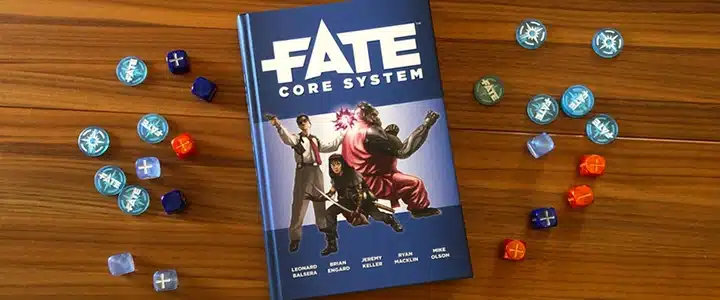At this point in #RPGaDay2023, you’d probably guess my favorite game system is Savage Worlds or Dungeons & Dragons 5e, and you’d be right.
So let’s talk Fate instead.
Descended from the earlier Fudge role-playing game, the earliest incarnation of Fate I played was Spirit of the Century. A pulp-y game of capable people ready to save the world from villainous plans, Spirit of the Century was the proto-Fate and the game the core rules would evolve from.
It’s a very un-D&D-ish game, with “combat” that can be verbal or physical, depending on the scene. In the core game, you get a bunch of skills ranging from great to average:
- One Great (+4) skill
- Two Good (+3) skills
- Three Fair (+2) skills
- Four Average (+1) skills
You also get Aspects, which a short descriptive phrases that provide situational benefits for your character. For example, for a Fate-based monster hunting game, my character had the Aspects “Last in his class at MIT” and “Can Hit The Broadside of a Barn”.
Those two aspects tell you a lot about him; he’s smart, but maybe something of a slacker. And he’s got experience shooting things, but he’s not awesome at it.
The game masters and players can bring these aspects into play during the game (e.g. the game master could offer up a Fate point – the game’s plot currency – to make my life more interesting when researching that particular theory in the library by pointing out that my character WAS last in his class at MIT…).
Scenes can also have Aspects, that players and GMs can tag to help their rolls. For example, in a battle fought on the deck of a pitching freighter during a thunderstorm and Aspect of “Dark and Stormy Night” could be identified – and used – to help avoid enemy gunshots.
And then there are the dice – Fate uses funky dice, which are d6s with a plus on two sides, a minus on two sides, and blanks on two sides. When you roll a test, you roll four Fate dice, add up the pluses, and subtract the minuses. Then you add in bonuses from skills and any aspects you were able to use. The end result is compared to a target number determined by the game master. It’s fast and straightforward … and usually has you looking for aspects you can invoke to improve your result.
The rules make Fate great for collaborative world-building as it encourages both players and game masters to dig in when describing a scene.
It’s a great game that I don’t get to play nearly enough. In fact, Fate of Cthulhu’s been sitting on my game shelf, just waiting to be played, since before the pandemic. It’s a time travel game in which investigators travel from the Mythos-ravaged future to prevent the apocalypse (there are several, and they all take place in 2020 … which is just weird since the game was released in 2019, and no one knew the pandemic was coming then).
The downside to that game is that is very much campaign-oriented, with the investigators working together to modify their timeline and save the future. This means it takes a sizable time commitment (at least a few months) but it’s there, waiting (and perhaps dreaming) until the stars and the gaming group align.
- This post is part of the RPG a Day 2023 event. Catch up on Nuketown’s posts via the project page and learn more about the event at its community page on Facebook.
Featured Image Meta
The Fate rulebook and a bunch of dice. Credit: Amazing Rando Design and the Fate-SRD.com.

